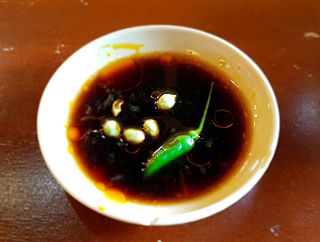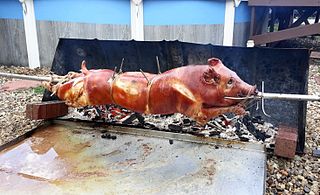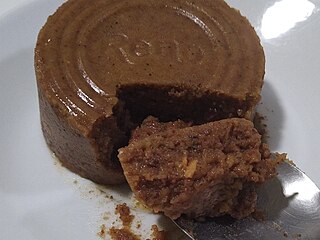
Fried rice is a dish of cooked rice that has been stir-fried in a wok or a frying pan and is usually mixed with other ingredients such as eggs, vegetables, seafood, or meat. It is often eaten by itself or as an accompaniment to another dish. Fried rice is a popular component of East Asian, Southeast Asian and certain South Asian cuisines, as well as a staple national dish of Indonesia. As a homemade dish, fried rice is typically made with ingredients left over from other dishes, leading to countless variations. Fried rice first developed during the Sui dynasty in China.

Chicharrón is a dish generally consisting of fried pork belly or fried pork rinds. Chicharrón may also be made from chicken, mutton, or beef.

Filipino cuisine is composed of the cuisines of more than a hundred distinct ethnolinguistic groups found throughout the Philippine archipelago. A majority of mainstream Filipino dishes that compose Filipino cuisine are from the food traditions of various ethnolinguistic groups and tribes of the archipelago, including the Ilocano, Pangasinan, Kapampangan, Tagalog, Bicolano, Visayan, Chavacano, and Maranao ethnolinguistic groups. The dishes associated with these groups evolved over the centuries from a largely indigenous base shared with maritime Southeast Asia with varied influences from Chinese, Spanish, and American cuisines, in line with the major waves of influence that had enriched the cultures of the archipelago, and adapted using indigenous ingredients to meet local preferences.

Kare-kare is a Philippine stew that features a thick savory peanut sauce. It is generally made from a base of stewed oxtail, beef tripe, pork hocks, calves' feet, pig's feet or trotters, various cuts of pork, beef stew meat, and occasionally offal. Vegetables, such as eggplant, Chinese cabbage, or other greens, daikon, green beans, okra, and asparagus beans, are added. The stew is flavored with ground roasted peanuts or peanut butter, onions, and garlic. It is colored with annatto and can be thickened with toasted or plain ground rice. Variations of kare-kare can be made with seafood, such as prawns, squid, and mussels, or exclusively from vegetables.

The generic term for condiments in the Filipino cuisine is sawsawan. Unlike sauces in other Southeast Asian regions, most sawsawan are not prepared beforehand, but are assembled on the table according to the preferences of the diner.

Banana ketchup, also known as banana sauce, is a Philippine fruit ketchup condiment made from banana, sugar, vinegar, and spices. Its natural color is brownish-yellow but it is often dyed red to resemble tomato ketchup. Banana ketchup was first produced in the Philippines during World War II due to a wartime shortage of tomatoes but a comparatively high production of bananas.

A pig roast or hog roast is an event or gathering which involves the barbecuing of a whole pig. Pig roasts, under a variety of names, are a common traditional celebration event in many places including the United Kingdom, Philippines, Puerto Rico and Cuba. It is also popular in the United States, especially in the state of Hawaii and in the Southern United States. In Southeast Asia, a pig roast is a staple among the Buddhist, and Christian communities, notably among Catholic Filipinos and Hindu Balinese people, or Buddhist Chinese people.

Chicken inasal, commonly known simply as inasal, is a variant of the Filipino chicken dish known as lechon manok. Chicken inasal is a grilled chicken part usually breast (Pecho) or leg (Paa) while a lechon manok is a stuffed whole chicken. It is chicken marinated in a mixture of calamansi, pepper, coconut vinegar and annatto, then grilled over hot coals while basted with the marinade. It is served with rice, calamansi, soy sauce, chicken oil and vinegar.

Lechon kawali, also known as lechon de carajay or litsong kawali in Tagalog, is a Filipino recipe consisting of pork belly slabs deep-fried in a pan or wok (kawali). It is seasoned beforehand, cooked then served in cubes. It is usually accompanied with a dipping sauce such as sarsa ng litson made from vinegar and pork liver or toyomansi.

Mama Sita's Holding Company, Inc. is a Philippine based manufacturer of condiments, selling its products under the brand, Mama Sita's. The brand is named after Teresita "Mama Sita" C. Reyes, matriarch of the company's founders, the spouses Bartolome B. Lapus and Clara C. Reyes-Lapus.

Paksiw is a Filipino style of cooking, whose name means "to cook and simmer in vinegar". Common dishes bearing the term, however, can vary substantially depending on what is being cooked.
Fruit ketchup is a condiment prepared using fruit as a primary ingredient. Various fruits are used in its preparation, and it is also used as a spread and marinade, among other uses. Banana ketchup is a type of fruit ketchup that is common in the Philippines.

Datu Puti is a condiment brand owned by NutriAsia, Inc.. Datu Puti was first introduced as a vinegar product in 1975 by Hernan and Ismael Reyes. Eventually, soy sauce and fish sauce under the Datu Puti brand were introduced in the 1990s. An oyster sauce product was also introduced.

UFC is a Philippine food brand owned by NutriAsia. It was first introduced as a banana ketchup brand in 1969.

Liver spread is a Filipino canned spread product made from pureed pork, beef, or chicken liver mixed with cereal and/or offal similar to the French pâté and German liverwurst. Liver spread is usually eaten as a filling for sandwich bread and an accompaniment to crackers but it is also used as an ingredient in dishes like lechon sauce and the Tagalog version of paksiw na lechon. It is also used in some households as an ingredient to some dishes e.g. caldereta and Filipino spaghetti.

Nutri-Asia, Inc., formerly Enriton Natural Foods, Inc. and its predecessors Southeast Asia Food, Inc. and UFC Philippines, Inc., is a Philippine privately held multinational food processing company headquartered in Bonifacio Global City, Taguig, Metro Manila. It is the leading producer of condiment products in the Philippines. Among its best known brands are Datu Puti, Mang Tomas, UFC and Silver Swan. As of 2019, NutriAsia has a total of 116 distribution networks locally and internationally.

Silver Swan is a Filipino condiment brand owned by NutriAsia through its subsidiary First PGMC Enterprises, Inc. It was first introduced as a soy sauce brand in 1942 by Sy Bun Suan. Later on, the brand was expanded to include vinegar, fish sauce, chili sauce and oyster sauce.

Dali Discount AG, doing business as Dali Everyday Grocery or simply Dali, is a Swiss international hard discount retail chain with a primary focus on Southeast Asia, particularly the Philippines. Its Singapore-based subsidiary, HDPM Sin Pte. Ltd., operates a local subsidiary known as Hard Discount Philippines Inc. (HDPI), which is headquartered in Carmona, Cavite.

















